
The spaghetti Western is a broad subgenre of Western films produced in Europe. It emerged in the mid-1960s in the wake of Sergio Leone's filmmaking style and international box-office success. The term was used by foreign critics because most of these Westerns were produced and directed by Italians.

Ace High is a 1968 Italian Spaghetti Western film directed and written by Giuseppe Colizzi and starring Terence Hill, Bud Spencer and Eli Wallach. The film is the second in a trilogy that started with God Forgives... I Don't! and ended with Boot Hill.

The Grand Duel, also known as Storm Rider and The Big Showdown, is a 1972 Italian-language spaghetti Western film directed by Giancarlo Santi, who had previously worked as Sergio Leone's assistant director on The Good, the Bad and the Ugly and Once Upon a Time in the West. The film stars Lee Van Cleef as a sheriff who seeks justice for a man accused of murder.
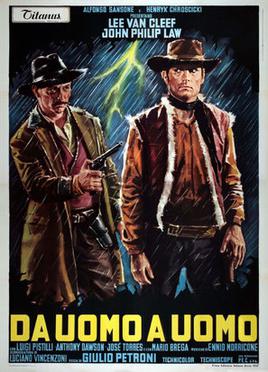
Death Rides a Horse is a 1967 Italian Spaghetti Western directed by Giulio Petroni, written by Luciano Vincenzoni and starring Lee Van Cleef and John Phillip Law.
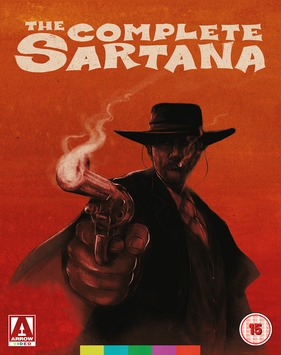
Sartana is a series of Spaghetti Western films which follows the adventures of the title character, a gunfighter and gambler who uses mechanical gadgets and seemingly supernatural powers to trick his rivals. The series features five official entries: If You Meet Sartana Pray for Your Death (1968), I am Sartana, Your Angel of Death (1969), Sartana's Here… Trade Your Pistol for a Coffin, Have a Good Funeral, My Friend... Sartana Will Pay and Light the Fuse... Sartana Is Coming. The first film was directed by Gianfranco Parolini, with the remaining four directed by Giuliano Carnimeo. Sartana is portrayed by Gianni Garko in all films in the series except for Sartana's Here… Trade Your Pistol for a Coffin, in which he was portrayed by George Hilton.
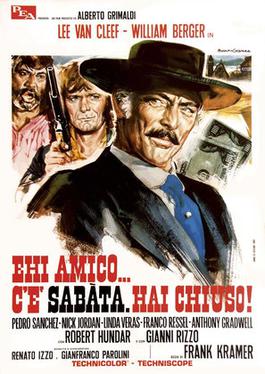
Sabata, is a 1969 Italian Spaghetti Western directed by Gianfranco Parolini. It is the first film in The Sabata Trilogy by Parolini, and stars Lee Van Cleef as the title character. Parolini had previously had a major success with the first Sartana Spaghetti Western If You Meet Sartana Pray for Your Death (1968), but the sequels were given to Giuliano Carnimeo. Producer Alberto Grimaldi contacted Parolini for a similar series of Sabata.

The Hills Run Red is a 1966 spaghetti Western film directed by Carlo Lizzani. The film stars Thomas Hunter in the heroic lead role, along with veteran American actors Henry Silva and Dan Duryea.
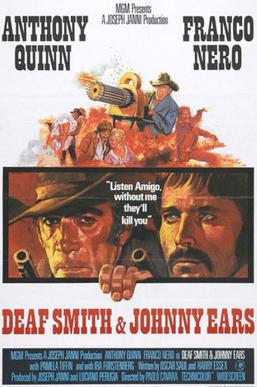
Deaf Smith & Johnny Ears, also known as Los Amigos, is a 1973 Spaghetti Western film starring Anthony Quinn and Franco Nero. The film is loosely based on the life of Deaf Smith, with direction by Paolo Cavara.
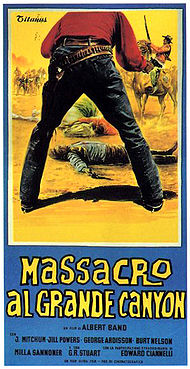
Grand Canyon Massacre is a 1964 Italian Spaghetti Western filmed in Croatia starring James Mitchum, Milla Sannoner, and George Ardisson. It was directed by Sergio Corbucci and produced by Albert Band. The film's theme song was performed by Rod Dana. The film has nothing to do with the Grand Canyon.
Giuseppe Colizzi was an Italian film director, writer and producer.
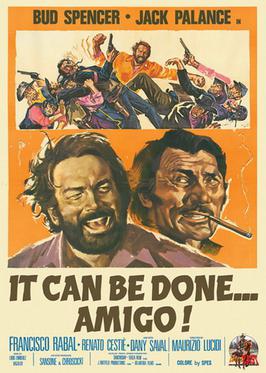
It Can Be Done Amigo is a 1972 Spanish / Italian / French film directed by Maurizio Lucidi.

Sundance and the Kid is a 1969 Spaghetti Western comedy directed by Duccio Tessari and starring Giuliano Gemma, Nino Benvenuti, and Sydne Rome. The film was also released under the titles Alive or Preferably Dead and Sundance Cassidy and Butch the Kid.

Trinity Is Still My Name is a 1971 Italian Spaghetti Western comedy film directed by Enzo Barboni. Starring the comedy team of Terence Hill and Bud Spencer, it is a direct sequel to They Call Me Trinity (1970). It was shot extensively in Campo Imperatore, Abruzzo. It was the highest-grossing Italian film to that point in time. In 1995, a sequel was made, Sons of Trinity, as a continuation of the Trinity series.

A Sky Full of Stars for a Roof is a 1968 Italian Spaghetti Western comedy film.

Tedeum is a 1972 Italian Spaghetti Western film directed by Enzo G. Castellari. The title role was initially offered to Tomas Milian, who eventually refused.
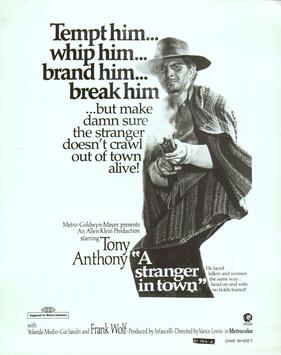
A Stranger in Town, released in the UK as For a Dollar in the Teeth, is a 1967 Italian-American Spaghetti Western film directed by Luigi Vanzi.
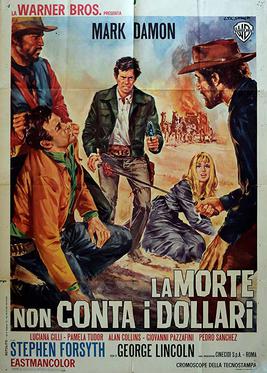
La morte non conta i dollari 1967 Italian spaghetti Western film directed by Riccardo Freda. The film is about Lawrence White who returns to his hometown of Owell Rock with his sister to avenge the father's death at the hands of a gang. The leader of the gang, Doc Lester has recently appointed himself the gunslinger Boyd as the new sheriff.
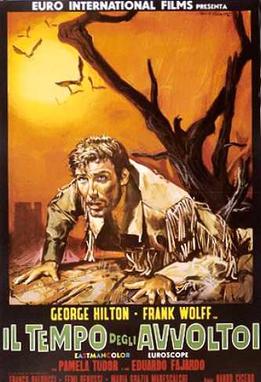
Il tempo degli avvoltoi is a 1967 Italian spaghetti Western film directed by Nando Cicero.

Red Blood, Yellow Gold, is a 1967 Italian-Spanish Spaghetti Western film directed by Nando Cicero.

God Forgives… I Don't! is a 1967 Spaghetti Western film directed and written by Giuseppe Colizzi. The film is the first in a trilogy, followed by Ace High and Boot Hill.



















